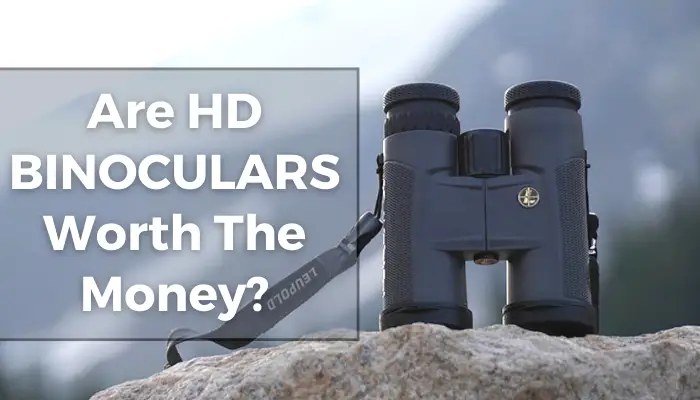This post may contain affiliate links which means I may receive a small commission for purchases made through the links. Learn More
In the recent past, the discussion about HD binoculars has become very common and almost all outdoor optics seem to be very curious about these binoculars and their performance. I have seen many people asking about HD lenses used in binoculars and their impact on the overall performance of the binoculars.
The question about HD binos comes to everyone’s mind when deciding which binoculars you should need for your outdoor activities. I found it very interesting to uncover and write this guide to ensure that my readers don’t remain confused anymore.
Are HD binoculars worth the money? Absolutely! HD binoculars offer clear and detailed images thanks to their high-definition lenses, which prevent the scattering of light. They also perform well in low light conditions and provide more pleasing colors to the eye. Additionally, HD binoculars reduce chromatic aberration, further improving image quality
However, they are slightly more expensive than normal binoculars and that can be a hurdle if you have a tight budget. Let’s dive deeper and learn more about HD binoculars and how they are helpful.
Related Article: Why are Binoculars Called Bins?
How do HD lenses work in binoculars?
HD lenses are the major difference in that some binoculars are very useful while an ordinary choice. These lenses are specialized in collecting and converging and ensure that the light rays don’t scatter, which usually happens in the binoculars of cheaper lenses.
When the light rays are not diverged or scattered and converge on one point, then you tend to see better visuals with more details of the target. The chromatic aberration goes away, making the visual more pleasing to the eyes.
HD lenses usually have a higher optical density which is ideal for preventing the light from scattering. The higher density of lenses is designed to reduce or eliminate distortions and aberrations. When the light rays converge at one point, then the glare production reduces.
The production of the color fringing and blurriness in the image which is usually caused by the chromatin aberration goes away as the higher optical density reduces the chromatic aberrations. In short, with high-density HD lenses, you tend to see more detailed visuals than with any non-HD lens binoculars.
Benefits of HD binoculars
In the previous section, I explained how HD (high-definition) lenses in binoculars work to improve image clarity and resolution. While understanding how HD lenses function is important, it’s also important to consider whether they are worth the investment. Below are some benefits that you’re going to get with HD binos and I am assured you’ll be convinced to buy HD binos.
1- Clearer and sharper images
When HD lenses are used in binoculars, they reduce chromatic aberration and support color balance in different light conditions. Due to less aberration and light loss, you tend to see clearer visuals with full detail of the objects no matter what light conditions are.
2- Improved low-light usability
Better lens quality means that the transmission of light will be increased to a significant level. When the light rays fall on the HD lenses, then no light gets lost; instead, the maximum transmission of light happens which ends up giving you a sharper and brighter visual at low light conditions.
3- Reduced chromatic aberration
Chromatic aberration happens when the light rays having different wavelengths don’t fall to a single point. As a result of chromatic aberration, you will see slightly blurry or unbalanced color fringing. The higher optical density of HD lenses reduces chromatic aberration and makes the visuals very clear. Even with HD lenses, the edge of the visuals will look very clear and soothing to the eyes.
Considerations for purchasing HD binoculars
The above advantages and my praise for the HD lenses are pretty cool and can take your mind. But there are a few factors that you should consider before making the final call about choosing them or just neglecting them for now.
1- Cost compared to non-HD binoculars
HD binoculars are costly when compared to those binoculars that don’t have HD lenses. These price differences matter a lot for those who have tight budgets. If the pricing of the product is a real concern for you, I suggest you go with non-HD binoculars and save extra bucks. Binos that don’t have high-quality lenses give a decent view.
But if you’re passionate about viewing and don’t have any budget problems, then these HD binoculars are specially made for you. Spending extra on those binoculars will definitely help you to view the target effortlessly. The color balance, brightness, and clarity will be prominent.
2- Personal needs and priorities
Purpose: Consider what you will be using the binoculars for and whether the improved image quality of HD binoculars is necessary for your needs. If you are not passionate about outdoor activities and use binoculars seldom then you don’t need to spend extra bucks on buying HD lenses.
In case you’re a passionate hunter or a vivid birder who loves spending time out there and using binoculars for more time, then I will certainly buy HD binoculars as they will uplift your fun by giving you clearer and more detailed visuals. HD lens binos are a must for hunters!
Also Read: Can Binoculars See through Walls?
Which outdoor activities require HD binoculars?
It is interesting and knowing those activities that require HD binoculars will help you know whether you need HD lenses or not. Right? I personally love birds and spending hours out in the garden to see the birds. To be honest, without having HD lenses in my binoculars, I would not have been able to see the details of flying birds. For birds watching HD binoculars are a must. Below is the list of those activities that require HD lenses;
- Hunting
- Astronomy
- Surveillance
- Photography
- Birdwatching
- Nature observation
- Sports & Event Watching
Conclusion
There is no doubt that HD binoculars are worth the investment due to their ability to provide clearer and sharper images, improved low-light usability, and reduced chromatic aberration. These benefits are achieved through the use of high-definition lenses which have higher optical density and they prevent the scattering of light. In the end, you should also see your budget and choose the binoculars wisely.

I’m a passionate outdoor activist who has got special love for optics. The school studies in optical mechanics and the travelling experience has made me an expert in optics like binoculars, scopes, and other devices. Stay connected with us for in-depth knowledge!

